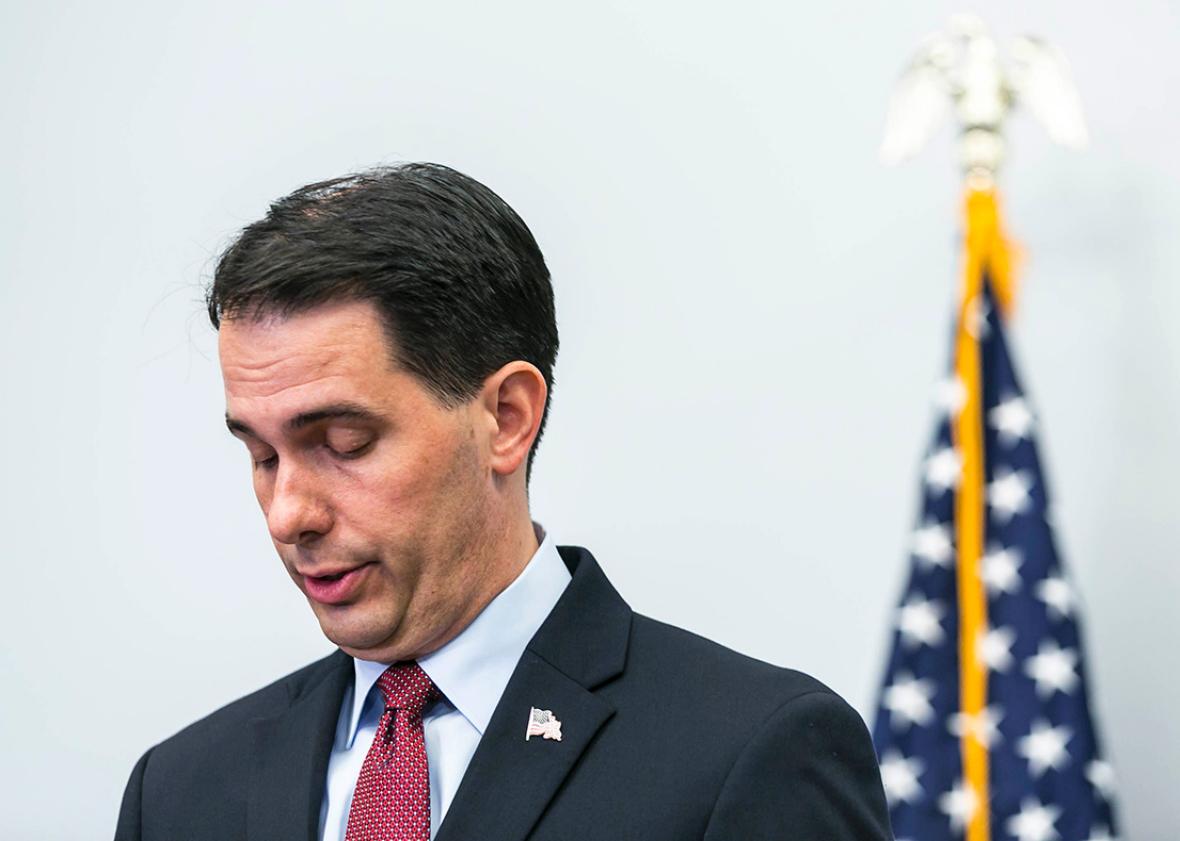Scott Walker was the perfect candidate on paper. He had no shortage of credentials to run through in his appeals to Republican donors and voters alike. Political observers are beyond familiar with them by now, but—in a last tribute to the second major presidential candidate to drop out of the herd—let’s run through his resume one final time: Three gubernatorial victories in four years in blue Wisconsin; a record of meaningful ideological accomplishment in the face of protests that swept up the nation; an appeal broad enough to stretch from social conservatives to libertarian-leaners like the Koch brothers to more traditional Republican establishmentarians.
It was impressive until it wasn’t.
The dramatic collapse in support Walker has seen in recent months, both nationally and in critical early states, earned him comparisons to that other great-on-paper Midwestern Republican candidate with executive experience from 2012, former Minnesota Gov. Tim Pawlenty. That’s not quite right: Pawlenty never took off. Walker, meanwhile, reigned atop Iowa polls for roughly six months, beginning with a “fiery” (read, loud) speech at January’s Iowa Freedom Summit. It appeared early on that he had found a way to marry his sterling GOP primary credentials with a voice that resonated.
That voice didn’t hold up well when confronted with complications. One such complication: questions. Those can be a major headache on the campaign trail if you are not good at answering them. Early stumbles on areas outside of his union-busting comfort zone, such as foreign policy and immigration, immediately raised red flags about whether he was ready for primetime. Walker’s team responded by erecting what reporters derisively referred to as “Fortress Walker,” walling him off from inquiries. The candidate who seemed so resolute in his conviction to quash public sector unions in Wisconsin wilted under questioning, flipping around between stances on the issues du jour at a comical pace, or caving to the whims of the party’s small but obnoxious elements.
Meanwhile, political novice Donald Trump presented voters with the missing element in Walker’s otherwise perfect résumé: the entertaining warrior, the unrepentant id. Where Walker would let long-term general-election concerns filter into his thought process when considering a response on immigration, Trump—how should we put this?—would not. He stole from Walker the Iowa lead he’d held for six months, which ended up being just long enough to prop up pundits’ expectations that he needed to win it. His super PACs, which raised impressive sums early on, burned through much of that money in a late-summer effort to arrest his free fall. As they spent more, he got more desperate, and his nearly nonexistent presence at the first two debates did not help his solicitation for further donations.
Walker literally hit zero in a national poll on Sunday. Yes, it’s early, and national polls don’t matter, and people are fickle, yadda yadda yadda. But when you hit zero … it’s probably time to go. Good on Walker for taking the hint that Bobby Jindal, Lindsey Graham, George Pataki, whatshisname, and whoshisface are refusing to take: It’s just not happening. Indeed, in Walker’s brief announcement Monday evening, he encouraged other underperforming candidates to wrap it up. “Today,” he said, “I believe I’m being called to lead by helping clear the field.” Rarely has ending a campaign due to total lack of support been explained with such self-aggrandizement, but hey, whatever makes it go down easier.
“The short answer is money,” a Walker source told the New York Times, explaining the move. “He’s made a decision not to limp into Iowa.” If Walker actually thought he had any chance, though, he’d have been perfectly satisfied to limp into Iowa with limited funds. The last two Iowa Republican caucus winners, Rick Santorum and Mike Huckabee, were each working with about three cents in campaign funds. But Walker could never find his voice, and he recognizes that. Now it’s all about lobbying the eventual nominee to let him serve as Labor Secretary, a perch from which he could realize his dream of smushin’ unions on a national scale without all that messy business of running for president.
